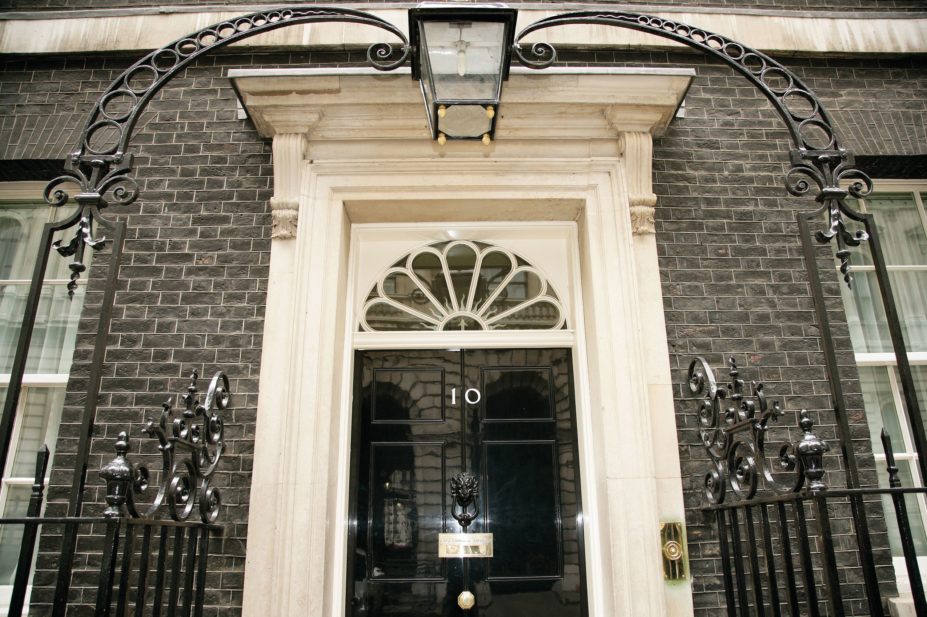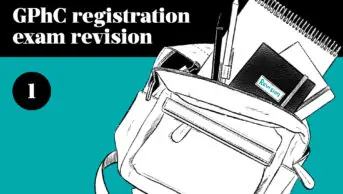
Slim Plantagenate / Alamy Stock Photo
The results of the UK general election on 8 June 2017 surprised many in the UK and beyond. The Conservative Party ended up with 318 seats, with Labour taking 262. Prime minister Theresa May is currently trying to reach a deal with the Democratic Unionist Party (DUP) to form a minority government.
The Pharmaceutical Journal asked pharmacists what their views were on the election result, and what it could mean for their profession.
Questions:
- What are your views on the general election result and pharmacy minister David Mowat losing his seat?
- What do you think are the implications for pharmacy and the funding cuts?
- What do you think is Mowat’s legacy? What could he have done differently? What impact did his actions have on you personally?
- What advice would you give to the incoming pharmacy minister?

Commentators
Top row (from left):
- Thorrun Govind, pharmacist at Sykes Chemist Limited; occasional locum
- Brendon Jiang, GP practice pharmacist, CLICK Federation, Somerset
- Terry Maguire, director of Northern Pharmacies Ltd and director of TA Maguire Ltd
Bottom row (from left):
- Ben Merriman, pharmacist, Gorgemead Ltd T/A Cohens Chemist
- Graham Phillips, superintendent pharmacist, Manor Pharmacy Group
- Altaf Vaiya, community pharmacy manager/director, Leicester
What are your views on the general election result and pharmacy minister David Mowat losing his seat?
Thorrun Govind: The general election result shows that the public is not happy with the Conservative offering, particularly regarding the NHS and Brexit. The Labour Party was the only party to state categorically that it would halt pharmacy cuts in England, although it was encouraging that pharmacy featured in three manifestos. David Mowat was ill-informed about the true impact of government policy, but I hope he will now take the time to reflect on these matters. As a sector, we remain ready to engage with sensible proposals the government can put forward.
Brendon Jiang: The general election result has caused nothing but chaos and controversy for the Conservative Party and the UK. I was shocked by the result. Despite the polls, I doubt people would actually believe that Labour could deliver on their lolly scramble of a manifesto. Besides, the dark art of polling has recently proven disastrously wrong in both Brexit and the US presidential election. It remains to be seen if Theresa May can piece together a government, how long it might last or indeed what the implication of a confidence and supply agreement with the DUP might mean. However, the electorate has spoken and we can expect a shift to the left.
Among the high profile political casualties is our pharmacy minister David Mowat, who failed to retain his seat in Warrington South. Something which seems to have caused delight among much of the pharmacy profession. It is understandable that he is an unpopular figure, serving as the minister in charge of wielding the axe of pharmacy austerity cuts.
Terry Maguire: One of the Democratic Unionist Party’s (DUP) election posters which featured a middle-class voter stating, “I want an MP who answers to us — not to the Tories” now seems highly ironic, prophetic even. DUP are the big winners in the 2017 Westminster election. Not only has it re-established itself as the biggest party in Northern Ireland with a 5% lead on its political nemesis Sinn Fein, it has increased its Westminster seats and has become, by default, king-makers. Members of the DUP are acute political animals and will milk the ‘deal’ with the Conservatives for all its worth — and it’s worth its weight in gold given that the party, with its 10 MPs, was the only lifeboat around to save a humbled prime minister. Northern Ireland can, at least, expect new shiny buildings and upgraded roads over the next five years but will it make any difference to community pharmacy? I’m not so sure.
David Mowat’s electoral defeat had nothing to do with his treatment of community pharmacy. Yes, it may have been a censure on the Tory’s treatment of the NHS. Mowat had but a token interest in the community pharmacy sector over his tenure. He was highly influenced by the treasury secretary, Philip Hammond, who viewed the unit cost of moving a medicine from the manufacturer to the patient as highly inefficient and too costly for what is being delivered. This became clear during the failed judicial reviews brought by the Pharmaceutical Services Negotiating Committee and National Pharmacy Association in March and since Hammond has been returned, and is being kept on as treasury secretary, community pharmacy has a challenge on its hands.
Ben Merriman: The general election of 2017 is one that will go down in history for so many reasons. Regardless of what was discussed and debated beforehand, the electorate has decided that it didn’t want what the Conservative Party was proposing. Yes, it is still the biggest party but it has been given a bloody nose by the people of the UK and is no longer as strong as it was, requiring help from other parties to govern. This is a chance for the party to rethink its manifesto and make changes that people want to happen. Speaking to people in the pharmacies I work for, that would mean allowing community pharmacies across England to take a proactive role in their patients’ health and improving their wellbeing, not simply “doling out medicines” as suggested by Simon Stevens, NHS chief executive.
Graham Phillips: The result was completely unpredicted. However, it is clear that the people of this country wanted to send a message to the government. First of all, arrogance doesn’t pay and secondly, if you call a general election, don’t hide! Be prepared to show up and argue your case. When Theresa May did appear on Question Time, a nurse had challenged her on austerity and May’s response was pathetic. Pharmacy played its part, given that 2.2 million people signed the petition against the funding cuts.
I don’t think it’s helpful to celebrate the demise of Mowat, because he was only the messenger. He didn’t originate the policy and who knows, maybe he didn’t even agree with it. However, that’s how politics works. Well before all of these austerity measures were introduced by the current government, the chief pharmaceutical officer of England was talking about there being too many pharmacies and that some should close.
Altaf Vaiya: I am glad that we had a hung parliament (short of a Labour majority this was the best thing to happen). People are sick of all the austerity measures being imposed by the Conservatives. I agree more with the Labour Party’s views and believe that, as a party, it supports pharmacy and acknowledges our contribution more than the Conservatives, particularly because it has promised to halt the pharmacy funding cuts in England. I actually spoke with Jonathan Ashworth, shadow health secretary, and was convinced Labour is pro-pharmacy without the empty promises that we usually hear from politicians.
I don’t think David Mowat understood or cared much for pharmacy. The profession did not feel it was well represented and therefore it is understandable that a lot of pharmacists are glad he lost his seat. Healthcare shouldn’t have a price tag, which is not how the Conservative Party sees it.
What do you think are the implications for pharmacy and the funding cuts?
Thorrun Govind: I’m concerned for the future of pharmacies as an industry. We know that many will close but it’s more than that. I worry about the impacts of the cuts on patients. The government still doesn’t seem to understand just what is at stake. It’s not about dispensing prescriptions like an automaton: it’s about the advice and reassurance we can offer our patients, and about acting as a bridge to wider NHS services. My hope is that we will now see a cross-party approach to health that will be far more realistic about the funding we require and the role we can reasonably be asked to play.
Terry Maguire: Health is a devolved matter so this election only impacts English pharmacy contractors because the three Assemblies are not affected and continue with their policies. Northern Ireland was due a new pharmacy contract in March but with the loss of our Assembly back in January, and with little appetite from Sinn Fein for local government with the DUP, the Assembly will not be returned. This will inevitably lead to direct rule from Westminster and a Tory minister will take charge of our health department. Oh the farce if that minister happens to be from the DUP!
With the Tories back in charge there will be no change to the funding cuts. Only Labour would have delivered that. What needs to be built on is the great work that got pharmacy into three main party manifestos. Providing real, hard evidence that pharmacists in the network do much more than merely shift boxes is now more important than ever before. Mowat’s legacy was the brutal cuts to the pharmacy envelope in England and that legacy will remain policy during the new Parliament and remember that it was a DUP health minister, Edwin Poots, who only recently was seeking a 20% reduction in the number of pharmacy contracts in Northern Ireland.
Only by informing and influencing the new administration and developing a new deal for the pharmacy network that will add value to each medicine dispensed can we avoid the atrophy of the network that the Conservatives seek. This is the clinical future successive governments wanted, but so far we have failed to deliver. Supplying metformin to a patient with type 2 diabetes is different from ensuring that the medicine controls his type 2 diabetes. Where that kind of support is provided by the pharmacy network, you begin to see the real value of pharmacy.
Ben Merriman: Given that the chief executive of the Pharmaceutical Services Negotiating Committee (PSNC) Sue Sharpe described the relationship between the Department of Health and the PSNC as having reached the “end of the road”, I hope that the result in the general election and formation of a new government will allow all parties, including the Royal Pharmaceutical Society, to start from scratch with a blank piece of paper and rebuild strong, mutually beneficial relationships. I want the government to rethink its plans, including the reckless cuts to the community pharmacy budget in England. Instead of weakening the sector, it should invest in it. We have seen in the PWC report, ‘The value of community pharmacy’ commissioned by PSNC and published in September 2016, that community pharmacies offer a £3bn net benefit to the NHS and social care sector with the provision of just 12 services. Investing in the sector will deliver even more efficiency to the NHS but do so in a sustainable way.
Graham Phillips: The pressure on Theresa May and the Tory government to end so-called ‘austerity’ is now stronger than ever. So if pharmacy steps up the political pressure there is a potential for a better outcome. The way to achieve that is not to say ‘no’ to everything, but to offer an alternative vision. We must portray ourselves as the solution, not the problem. We need to lay out a clear vision and explain how our profession can help save the health and care system and (also) save the Treasury money.
In terms of the cuts, if we can offer an alternative solution to help the government save money (by preventing visits to GPs and hospitals, for example) there is a fighting chance that these cuts could be reduced or halted.
The fact that pharmacy was mentioned in all three party manifestos is a huge achievement.
Altaf Vaiya: We still have the same secretary of health, Jeremy Hunt, so I cannot envisage any change to the way the NHS and healthcare professionals are being treated currently. I hope that if we have a strong opposition it may make a difference to the current state of things. I think the cuts will go ahead.
What do you think is Mowat’s legacy? What could he have done differently? What impact did his actions have on you personally?
Thorrun Govind:
We are all seeing workload increase and demands on our time increase. The need to hit targets for services just for the additional revenue they provide is putting even more pressure on retail pharmacy. Pharmacies have had to look at making efficiencies, which does mean that people are being made redundant. I’ve been to work as a locum at severely understaffed pharmacies. As a direct result of the cuts, we’re losing dispensers and counter staff with years of experience, and that means that as pharmacists we’re losing a level of support which we’ve come to rely on.
Brendon Jiang: I don’t know the intricacies of Westminster but feel that Mowat was just a figurehead, his hands tied by strings pulled by more senior cabinet colleagues.
I largely agree with his desire to move away from dispensing volumes toward a services-based contract, that it is unfortunate the 100-hour loophole has led to some areas having ‘clusters’ of pharmacies and that action is needed on the Murray report on community pharmacy clinical services (
Pharmaceutical Journal 2017;298:12).
However, I have seen first-hand how some companies have responded to the cuts by reducing the number of support staff and pharmacist hours, while expecting the same outputs. Many of my colleagues who own their own businesses say they are tearing out their hair trying to find money to pay the bills and make ends meet. Workforce pressures, highlighted not so long ago, are being amplified and it seems inevitable that there will be closures and consolidation in the sector.
Despite only holding his position for less than 12 months, Mowat will likely leave behind a sour taste in the mouths of pharmacists. His cuts are a bitter pill to swallow and it seems unlikely that there will be any significant change in government policy.
Ben Merriman: In a way, I feel sorry for Mowat — he was merely a junior minister toeing the party line. Unfortunately, decisions that were outside his remit (and were actually made before he took office) have been pinned on him. It was only after the judicial review that we actually found out where the decision was made — the cuts to the community pharmacy budget were from the Treasury. He had a choice between his career and to do what was right and until we’re in that situation, I don’t think we can make a judgment on the decision he made.
Graham Phillips: I don’t think Mowat could have done anything different. He was a junior minister with no background in health and social care who was at the mercy of his advisers — notably the chief pharmaceutical officer, Keith Ridge. In political terms he was merely cannon-fodder for Jeremy Hunt and Philip Hammond. Meanwhile, the long-term sustainability of my business is in question — I’m worried about how I will pay my bills. A colleague who runs a high quality pharmacy cannot pay his wholesaler bill and has to pay it off over a period of time, which means he will lose the discount he usually receives.
Altaf Vaiya: Mowat should have been more vocal and supportive of pharmacy. Maybe community pharmacy needs to improve and change in some areas, but drastic cuts to funding is the wrong way to go about it. Personally, I am trying to weather the storm as a result of the cuts to my business, and I feel there is such low morale within the profession.
What advice would you give to the incoming pharmacy minister?
Thorrun Govind: NHS and pharmacy staff are a large voting group to get on the wrong side of, especially with the number of patients they meet every day, all of whom rely on the NHS. The incoming minister needs to realise that an Amazon-style model will result in worse outcomes for patients. We need pharmacist independent prescribers accessible and in local community pharmacies and we need a national minor ailments scheme in England. If we want to save money for the NHS, we need to invest in pharmacy.
Ben Merriman: He or she should engage with the sector, learn about what we do and how we do it and feed back how the sector can improve the health and wellbeing of the British public. I’m fed up with political buzzwords and having meaningless statistics thrown at me, my colleagues and the people who use our services. I want someone to do the right thing by the people that gave them their job in the first place and allow them to receive a range of first-class pharmaceutical services from a strong and efficient community pharmacy network.
Graham Phillips: Engage! Start listening! We are a sector that can provide solutions if you allow us to. We need meaningful engagement and a genuine partnership between pharmacy and the government, in the same way they work with the medical profession.
Altaf Vaiya: Start engaging and listening to us. No more cuts hidden behind ‘efficiency savings’. We need to invest money to make money. The austerity measures have to stop. The value that the pharmacy profession gives back is something that the minister should consider.
You may also be interested in

Pharmacy regulator considers giving up legal authority to conduct covert investigations of pharmacists

More than 40% of people with ADHD waiting at least two years to access mental health service, study finds
